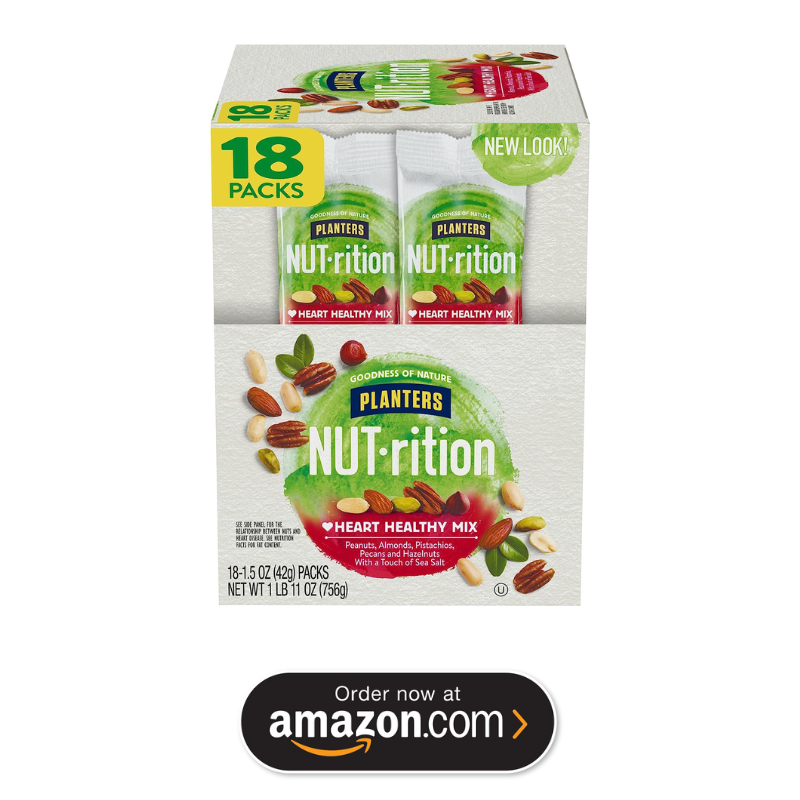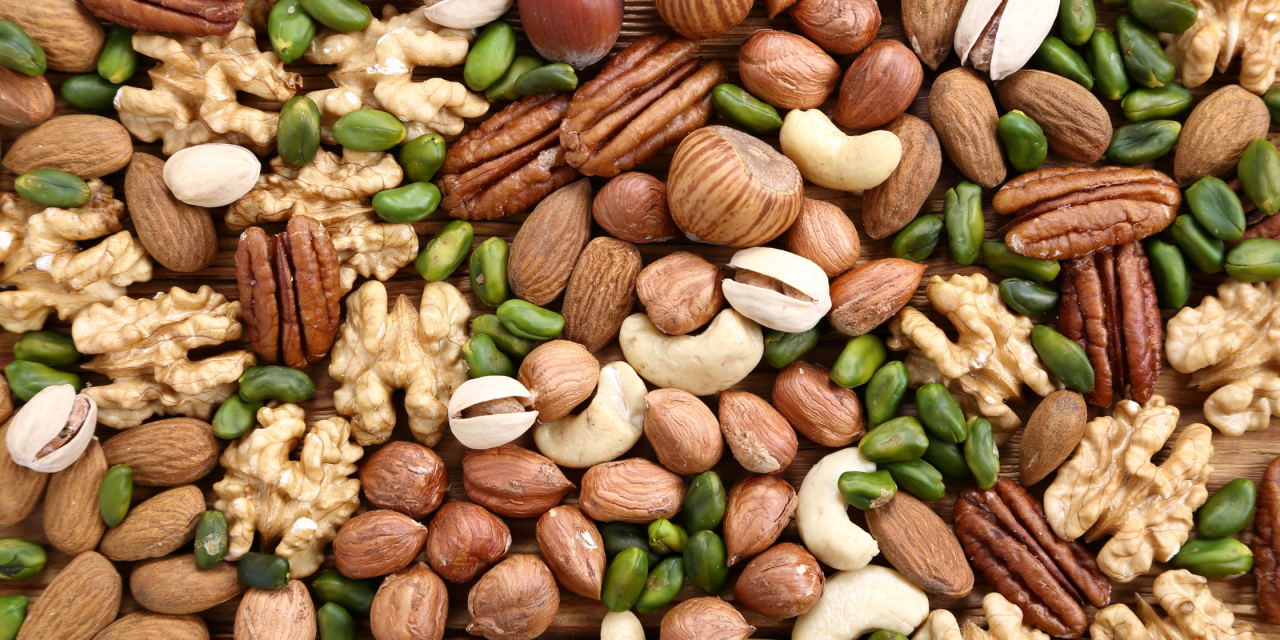Nuts: Natural Allies Against Insulin Issues, High Cholesterol, and Stroke Threats
Imagine a world where a handful of delicious nuts each day could drastically improve your overall health, reducing your risk of heart attack, stroke, and diabetes. In this enlightening article, you’ll discover just how that may become your reality.
Detailed studies suggest that frequent consumption of nuts can help lower inflammation related to heart disease and diabetes and significantly lower your risk of serious health complications.
Incorporating this tasty snack into your daily diet could improve your artery health, reduce bad cholesterol, and even lower the risk of high blood pressure.
As we age, our metabolism slows down, leading to weight gain and other health issues such as diabetes and heart disease. However, don’t be too quick to eliminate all fats from your diet in the quest for weight loss. You’ll find out that it isn’t always the best course of action, especially regarding nuts.
Despite commonly held beliefs, medical studies show that those who eat nuts regularly, in moderation, often lose more weight than those on a low-fat diet alone.
This interesting revelation, along with many others surrounding the health benefits of nuts, is explored further, providing you with a wealth of valuable information for your life journey toward better health and well-being.
The Benefits of Eating Nuts
Who knew that such tiny powerhouses could deliver so many health benefits? The truth is that incorporating nuts into your diet can provide a wide range of health benefits. Let’s look deeper into some of these benefits in the following sections.

Lowering levels of inflammation related to heart disease and diabetes
First and foremost, nuts have the ability to lower the levels of inflammation that are often associated with heart disease and diabetes. This is large because nuts are rich in antioxidants and omega-3 fatty acids, which both have anti-inflammatory properties.
Improving artery health
In addition to reducing inflammation, nuts can also help improve the health of your arteries. Certain types of nuts contain L-arginine, an amino acid that can help improve the health and flexibility of the artery walls, making them less prone to blood clots.
Reducing the risk of blood clots
Speaking of blood clots, nuts can also help to reduce the risk of this forming. This is mainly because of the omega-3 fatty acids they contain, which have the ability to prevent blood platelets from clumping together and forming clots.
Lowering the risk of high blood pressure
If you’ve been trying to lower your blood pressure, you’ll be happy to hear that nuts can help with this too. The potassium and magnesium in nuts can help your blood vessels relax, thus lowering your blood pressure.
Lowering the risk of early death due to heart disease
Nuts can also lower the risk of dying early from heart disease. This is because eating nuts regularly can help lower levels of low-density lipoprotein (LDL, or “bad”) cholesterol, reduce inflammation, and improve heart health.
Lowering unhealthy cholesterol levels
Nuts can also help lower unhealthy cholesterol levels. Most types of nuts contain high amounts of unsaturated fats, which can help reduce overall cholesterol levels and particularly lower LDL cholesterol.
Reducing the risk of stroke
Lastly, nuts can help reduce the risk of a stroke. This is attributed to the host of heart-healthy nutrients contained within nuts, from omega-3s to unsaturated fats to antioxidants.

The Impact of Nuts on Insulin Resistance
Now, let’s focus on how nuts can positively impact insulin resistance.
Nuts can help with weight loss
Despite their high-calorie content, nuts can actually help with weight loss. This is due to their high fiber content, which can help keep you feeling fuller for longer, reducing overall calorie intake.
Nuts provide essential fats for the body’s metabolism
Nuts are a great source of essential fats that your body needs for its metabolism to function properly. These fats can help increase your body’s insulin sensitivity, which is crucial for maintaining healthy blood sugar levels.
Research shows that nuts can prevent insulin resistance
A number of scientific studies have shown that eating nuts can help prevent insulin resistance. This is mainly due to the unsaturated fats, fiber, and other nutrients found in nuts that help improve blood glucose control.
Nuts can improve insulin sensitivity
As previously mentioned, nuts can improve insulin sensitivity. This is important because high insulin sensitivity allows your body to use glucose more effectively, which can help prevent the development and progression of type 2 diabetes.

The Link Between Nuts and Bad Cholesterol
Let’s explore the direct correlation between nuts and bad cholesterol.
Monounsaturated fats in nuts can lower bad cholesterol levels
The monounsaturated fats found in most nuts can help decrease LDL cholesterol levels. This is crucial because high LDL cholesterol can lead to a buildup of plaque in the arteries, increasing the risk of heart disease.
Nuts like walnuts and almonds have been proven to lower LDL cholesterol
Specifically, walnuts and almonds have been shown to lower LDL cholesterol. Studies have shown that eating a few ounces of these nuts each day can lower LDL cholesterol levels by several percentage points.
Nuts can also lower triglyceride levels, reducing the risk of clogged arteries
In addition to lowering LDL cholesterol, nuts can also lower triglyceride levels. High triglyceride levels can contribute to the hardening of the arteries, raising the risk of heart disease, so this is yet another heart-healthy benefit of eating nuts.

Reducing the Risk of Stroke with Nuts
Now, let’s discover how nuts can help reduce the risk of stroke.
Certain nuts, such as pecans and pistachios, can improve cognitive function and reduce the risk of stroke
Certain types of nuts, like pecans and pistachios, have been linked to improved cognitive function. By improving brain health, these nuts can help reduce stroke risk.
Nuts reduce inflammation, a major contributing factor to strokes
As mentioned earlier, nuts have anti-inflammatory properties. Given that inflammation is a major contributing factor to strokes, consuming nuts regularly can help keep this risk at bay.
The fiber in nuts slows the absorption of sugar, preventing insulin resistance that can lead to stroke
The high fiber content in nuts also plays a key role in reducing stroke risk. Fiber slows down the absorption of sugar into the bloodstream, preventing spikes in blood sugar and insulin resistance, both of which can increase the risk of stroke.

The Nutty Way to Improve Heart Health
Now, let’s find out how nuts can improve heart health.
Nuts are rich in monounsaturated fats, which promote heart health
As previously mentioned, the monounsaturated fats in nuts promote heart health. They do this by lowering bad cholesterol levels and raising good cholesterol levels, both of which contribute to healthier arteries.
Nuts can reduce the risk of heart disease, depression, and type 2 diabetes
Beyond heart health, nuts also reduce the risk of several other health problems. These include heart disease, depression, and type 2 diabetes, all thanks to the variety of vitamins, minerals, and healthy fats present in nuts.
Nuts like macadamia nuts and hazelnuts can lower blood pressure and improve cardiovascular health
Particularly, macadamia nuts and hazelnuts have a positive effect on blood pressure and overall cardiovascular health. Their high levels of monounsaturated fats and other nutrients can help lower blood pressure and increase heart health.

Choosing the Right Nuts for Optimal Health
While all nuts offer health benefits, some might be more suitable for your specific health needs than others.
Different nuts have different health benefits
Each type of nut brings its own unique set of health benefits to the table. Therefore, including a variety of nuts in your diet can ensure you get a broad spectrum of nutrients.
Pistachios are filled with folate, which is beneficial for heart health
Pistachios, for instance, are a great source of folate. This nutrient is essential for heart health and is particularly beneficial for people with a high risk of heart disease.
Pecans are packed with antioxidants that protect against chronic diseases
Pecans are rich in antioxidants, which can help protect against chronic diseases like heart disease and cancer. They also contain a good amount of fiber and healthy fats, contributing to overall health.
Almonds are high in fiber and promote cardiovascular health
Almonds are another excellent nut choice. They’re high in fiber, which can help lower cholesterol, and they also contain a number of nutrients that promote cardiovascular health.
Cashews contain healthy fats, fiber, and protein, as well as important minerals like zinc
Cashews, too, is a wholesome choice. They contain a high content of healthy fats, fiber, and protein, as well as important minerals like zinc, all of which contribute to various aspects of health.
Macadamia nuts are calorie-dense, but their monounsaturated fats are heart-healthy
While macadamia nuts are high in calories, don’t discount them just yet. Their high content of monounsaturated fats are heart-healthy, and they also contain a good amount of fiber and protein.
Hazelnuts improve cardiovascular health and protect against chronic diseases
Hazelnuts can offer considerable benefits for cardiovascular health and protection against chronic diseases. This is due to their high omega-3 fatty acids content and other health-protective compounds.

The Best Time to Eat Nuts
Now that you know which nuts to choose, let’s find out the best time to eat them.
Eating nuts in the morning or early afternoon is ideal for weight management and energy levels
While you can enjoy nuts at any time, having them in the morning or early afternoon can be most beneficial for weight management and energy levels. They provide a good balance of protein, fat, and fiber, which can keep you satiated and energized throughout the day.
Combining fats and protein in nuts can provide a sense of fullness and satiety
Whether eaten as a snack or as part of a meal, nuts can help provide a sense of fullness and satiety. This can be very beneficial for those trying to manage their weight or stave off hunger pangs between meals.
Eating nuts before exercise can provide fuel and enhance performance
If you’re about to head to the gym or for a run, eating some nuts beforehand can give your body the fuel it needs to perform well. The protein and healthy fats in nuts provide long-lasting energy that can keep you going throughout your workout.
Avoid eating nuts late at night to prevent digestive issues and sleep disturbances
While nuts are generally healthy, eating them late at night might not be the best idea. This is due to their high fiber and fat content, which can lead to digestive issues and sleep disturbances if consumed too close to bedtime.

Conclusion on Nuts for Health
To sum it up, eating a handful of nuts regularly can significantly impact reversing insulin resistance, reducing bad cholesterol, and lowering the risk of stroke. Nuts are a nutrient-dense food that provides essential fats, fiber, and protein.
Choosing a variety of nuts can ensure a wide range of health benefits, as each type brings its own unique set of nutrients. It’s important to incorporate nuts into a balanced diet and to eat them at the right times for optimal results.
So, next time you’re looking for a healthy and nutritious snack, reach for a handful of nuts!





